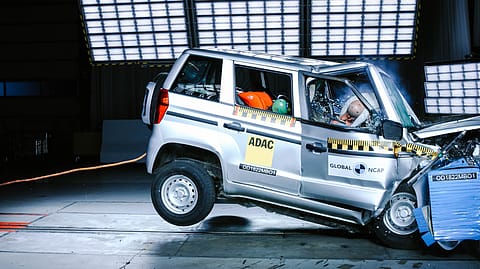Mahindra Bolero Neo scores 1 star in GNCAP crash test
Mahindra Bolero Neo showed low protection for adult protection in the frontal crash with an unstable structure, says Global NCAP.

The Mahindra Bolero Neo scored only one star for both adult and child occupant safety at the Global New Car Assessment Programme (Global NCAP) crash tests.
"The Mahindra Bolero Neo was tested under Global NCAP's latest protocols and showed low protection for adult protection in the frontal crash with an unstable structure, unstable footwell area, weak chest protection for the driver and poor feet protection. The front impact protection showed a significant difference with side impact protection," says GNCAP.
The assessments are amongst the final tests in the Safer Cars For India campaign as Bharat NCAP becomes fully activated.
"We were disappointed to see Mahindra's one star rating for the Bolero Neo. This falls well below the safety performance we have come to expect from the manufacturer," says Alejandro Furas, secretary general, Global NCAP.
The Honda Amaze is rated two stars for adult and zero stars for child occupant safety.
"Regrettably Honda did not take the opportunity to update the Amaze with more safety features which explains its disappointing score," says Furas.
In a statement, the Japanese carmaker says the South Africa spec 2nd Generation Amaze has already been tested as 4 star by GNCAP in 2019. “The latest test basis new protocol shows that the total score is of 5 star level. However mainly due to requirement of certain equipment like Electronic Stability Control and Side Curtain Airbags, it resulted in lower rating,” it says.
Recommended Stories
“At Honda, our unwavering commitment to safety is evident in the meticulous engineering of our products, integrating advanced active and passive safety technologies across our entire model range. We are dedicated to continuously work to enhance our vehicles on all parameters of Safety and improve them further at model change timing,” the company says.
The Kia Carens originally scored zero stars for adult protection and after improvements from the manufacturer and a retest, achieved three stars in adult safety and five stars for child occupants.
On the South Korean carmaker, Furas says there has been an improvement in Kia’s rating for the Carens since its original test when the model scored a zero rating for adult occupant protection. “However we were expecting a better performance in the retest given the Carens is fitted with six airbags as standard,” Furas says.
“This mixed set of results demonstrates that more effort is still needed from some manufacturers to prioritise vehicle safety in the Indian market,” says David Ward, president of the Towards Zero Foundation said,
(INR CR)
“We have seen a great deal of improvement throughout our #SaferCarsforIndia campaign but it’s clear that maintaining this safety momentum is crucially important. We will be discussing this and other key vehicle safety matters for India during an NCAP24 panel session later today,” says Ward.
The Carens was tested under the previous Global NCAP protocols reaching three stars for adult and child occupant protection. Since that time the Carens was reassessed under the new protocols (2022). The structure was improved but the test showed high neck values for the driver, resulting in zero stars for adult occupant protection. That triggered an immediate reaction from Kia to improve the neck performance, improving the restraint systems.
Global NCAP’s updated protocols assess frontal and side impact protection for all tested models, Electronic Stability Control (ESC), pedestrian protection and side impact pole protection assessments are also required for vehicles scoring the highest star ratings.
Global NCAP is a programme of the Towards Zero Foundation, a U.K. based charity working internationally in support of the new UN Decade of Action for Road Safety, with a goal of halving road deaths and serious injuries by 2030.